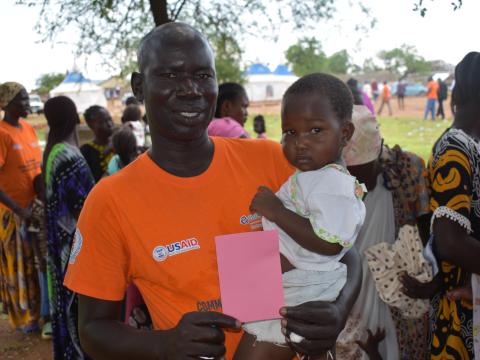Playing the big catch-up: South Sudan kicks off national measles campaign

Vaccinations save lives. “Vaccines are good for our children because there is an outbreak of measles in the country. Vaccines can save my daughter and other children from contracting the disease,” said Jimmy Apire as he recalled the recent measles outbreak in his community. Jimmy is a father of four who resides in Hai Baraka, a suburb in Juba County whose nearest health facility is five kilometers away.
The importance of vaccination was highlighted in last month’s celebration of the African Vaccination Week, marking the rollout of South Sudan’s national integrated measles follow-up campaign. Underscoring the need to increase awareness of the importance of vaccinating children, particularly on how vaccinations can save the lives of children and mothers from vaccine-preventable diseases, and encourage communities and families to vaccinate their children against vaccine-preventable diseases, the CORE Group Partners Project (CGPP), in collaboration with the Central Equatoria State Ministry of Health, joined the rest of the world to commemorate the African Vaccination Week last 24-30 April 2023 under the theme, “the big catch-up” in Hai-Baraka of Juba County.
Jimmy, who also participated in the event, shared that accessing vaccines had been a challenge in Hai-Baraka. “We have never received vaccines in this area. We always go to Gurei Primary Health Care Center, which is too far. Traveling to the facility is expensive.”

Jimmy believes children are the responsibility of both parents, “and if all get involved, the women will be encouraged to make the right choices for their children and families, and their burdens will reduce.” He had become a strong advocate for vaccines in his community and a role model for other men to understand that vaccinating children is not only the responsibility of the mothers.
The event brought together over 450 people from the county education department, John Snow Inc. (JSI), Intra Health, Health Link, Rescue Initiative South Sudan, Health Pooled Fund, youth leaders, women representatives, local chiefs, caretakers, and schoolchildren. The day was celebrated through marching by the brass band, drama by Junubin chronicles, recitation of poems on immunisation by schoolchildren, testimonies from polio survivor’s parents, a comedy, and launching of the vaccination activity, which resulted in vaccinating 140 children with different antigens or disease-preventing vaccines for life-threatening diseases such as tuberculosis, polio, Penta (diphtheria, pertussis, tetanus, and hepatitis B and Hib), and measles.
During the event, Celestino Oryem, the Juba County health director, encouraged parents to report any health events to the health facilities before it was too late to save their lives. “The African Vaccination Week is an important opportunity for caregivers and the community to get their children vaccinated against vaccine-preventable diseases,” he said. He also emphasised that the vaccines are safe and accessible and that all those whose children are vaccinated should act as ambassadors to encourage other parents to bring their children vaccinated.
“Vaccination is the only efficient and cost-effective public health intervention to reach vulnerable children and women with lifesaving vaccines. This African Vaccination Week reminds us of our commitment to this noble cause,” CGPP South Sudan director Anthony Kisanga said.
South Sudan is the lead implementing partner of CGPP in South Sudan. CGPP is funded by the United States Agency for International Development or USAID.
Story and photos by Jemima Tumalu, World Vision South Sudan and CGPP Communications Officer